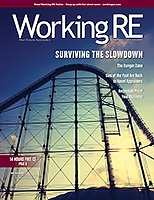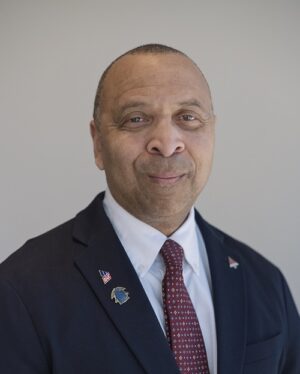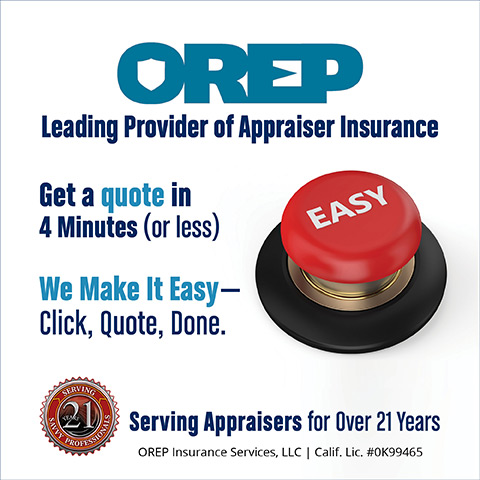 |
> The Appraiser Coach
> OREP E&O |
Byron Miller: AI Candidate with a Vision for the Future
by Isaac Peck, Publisher
Now more than ever, the appraiser profession is confronted with a myriad of threats and challenges: the GSEs’ new “Valuation Acceptance” programs, the rise of Property Data Collection and other appraisal alternatives, a historically slow real estate market, lower fees created by AMC monopolization, allegations of bias and racial discrimination against individual appraisers, and a general lack of diversity within the profession itself.
In the face of such challenges, there is often a call amongst appraisers to band together. “Why don’t appraisers have a stronger association that defends their interests?” and “What can appraisers do to unite, improve, and protect their profession?” are questions that are often asked.
Working RE sat down with Byron Miller, SRA, AI-RRS, ASA, RAA, MSSE, an appraiser who has a vision for how appraisers can work together to effect change.
Miller is a candidate for the eventual Presidential role at Appraisal Institute (AI), the largest association of appraisers, to get his take on the direction he’d like to see the appraisal profession, and AI as an organization, take.
In his home state of Minnesota, Miller has proven to be an incredibly effective citizen-lobbyist. Alongside a handful of other passionate boots-on-the-ground real estate appraisers, Miller succeeded in passing half a dozen laws in the state that protect real estate appraisers and improve the laws governing real estate professionals. (See Grassroots Lobbying 101: How Appraisers Can Effect Change.)
While AI has sometimes been viewed as an organization that caters more heavily to commercial appraisers, Miller is a residential appraiser and sees a path forward where AI can serve the residential appraiser community and defend the interests of all appraisers.
Lastly, Miller is a Black appraiser and, if elected, would be the first Black President of the Appraisal Institute since it was founded in 1991 through the merging of AIREA & SRA.
The AI National Nominating Committee is set to vote on Miller’s candidacy in mid-May.
Here’s what we learned in our interview with Miller.
Question and Answers with Byron Miller
Working RE: Why do you want to serve as AI President?
Miller: Two words come to mind—service and impact. Service is instilled in my DNA. My parents taught me that giving back is one of the most impactful things I can do as a person. The credo of my church says: “service is our law.”
Applying this to the Appraisal Institute, my service is to our members. It is our members who make this organization great, and without them there would be no AI.
The second motivation is to be impactful. I am attracted to solving difficult problems—particularly those that can have a lasting impact. The position of AI President places me in a leadership position to work with AI members and staff to find impactful solutions to problems facing our organization and profession.
(story continues)
Working RE: There is a general perception amongst residential appraisers that AI caters more towards commercial appraisers. Why do you think that is? Why aren’t more residential appraisers Members of AI?
Miller: As a residential appraiser myself, I know some residential appraisers feel AI is not very focused on residential issues. Residential appraisers feel that they don’t have a voice. To counter that, the AI Board of Directors just voted in the last several months to elevate the Residential Appraisal Project Team (RAPT) to the Residential Appraisal Committee (RAC). That is a big step in the right direction. Being a stand-alone Committee within AI’s structure means they will report directly to the Board and gives the residential team more flexibility and free-ranging ability to act on things. So, helping residential appraisers have more say within the organization is important and is being done now.
Another issue AI is working on is getting clients to value the designation for residential appraisers. AI provides industry-leading education for both commercial and residential appraisers, so it’s important for clients of appraisal services to recognize the value of that.
In terms of legislation to protect the profession, I don’t pretend to have all the answers. I love talking to people and building consensus. I’d love to see residential appraisers start dialoguing, voicing their concerns to the Residential Appraiser Committee, and reaching a consensus on which issues are the most important to pursue.
It is important that appraisers speak up about what is happening in their industry as well. AI recently sent a letter to Sandra L. Thompson, Director of the Federal Housing Finance Agency regarding the GSEs’ new Value Acceptance program and the recruitment of property data collectors as a separate “workforce” in the valuation process. These are important topics and it is good to see AI lobby and speak up on the residential appraisers’ behalf.
Working RE: Why should appraisers join AI? What’s the point?
Miller: One word, preservation. Our most important benefit is advocacy and representation; education is important too, but without advocacy, there would be no appraisers, and thus, education would be moot. AI is the only organization that has a professional full-time lobbying staff. Appraisers need a seat at the table and folks like Bill Garber and Scott Dibiasio represent AI to legislators to advocate for the profession. I go back to the old saying: “You need to be at the table or you’re on the menu.” So, self-preservation, and preservation of our profession, are good reasons to join.
Working RE: Why do you think diversity is important in the appraisal profession?
Miller: I think it is important to have a workforce that looks like the America that we serve. Many studies show diversity in the workforce is more beneficial to a company’s bottom line. As a profession, we benefit from an increased diversity of appraisers. So, from a corporate and societal point of view, it’s beneficial.
I don’t think it’s just about racial diversity either. I’ve always had friends across the cultural, political, and economic spectrum; that’s the way I was raised. It has made me a much more enriched person. Part of our problem is that folks are exclusive—we tend to cluster with like-minded people. So being exposed to other thoughts and ways of thinking benefits society as a whole. I think that same concept applies to the appraiser profession.
To that end, AI has partnered with Urban League, and launched the Institute’s Appraiser Diversity Initiative, and that’s a good start. I support training a diverse workforce in a profession that has historically been pretty monolithic. At the same time, AI’s diversity work has just started. We need to go further. I think the challenge is to avoid looking at this like a short-term problem. Diversifying our profession takes time. In my opinion, to see significant changes in the make-up of appraisers is going to be a 10-year journey–at the very least.
We need a continued commitment both verbally and in resources to ensure we are diversifying our workforce. I also want to emphasize that when I say diverse, we don’t want to be exclusionary. We want more people of color in the appraiser profession, but we also want more appraisers. And that means ALL people as well. I have observed in our profession that we are guilty of either/or thinking for solving problems, when there is a plethora of solutions out there. Thus, in my opinion, it’s not an either/or, but both.
Working RE: Is there anything else you want people to know?
Miller: My vision for AI is one that protects appraisers, increases our ranks, and provides other options for work, while maintaining the public trust. Appraisers are stronger together than we are separate. I would strongly encourage appraisers to join the Appraisal Institute or one of the other professional appraiser organizations. I am very excited and optimistic about our future! It’s a new day at AI where we can get back to our roots. That is, to Designate appraisers, Advocate for appraisers, and Educate appraisers (DAE).
Click Here to View Byron Miller’s Questionnaire Responses
About the Author
Isaac Peck is the Publisher of Working RE magazine and the President of OREP, a leading provider of E&O insurance for real estate professionals. OREP serves over 10,000 appraisers with comprehensive E&O coverage, competitive rates, and 14 hours of free CE for OREP Members (CE not approved in IL, MN, GA). Visit www.OREP.org to learn more. Reach Isaac at isaac@orep.org or (888) 347-5273. CA License #4116465.
OREP Insurance Services, LLC. Calif. License #0K99465





by Akia Smith
Excellent article! Love “it’s a new DAE at AI” Great campaign slogan
-